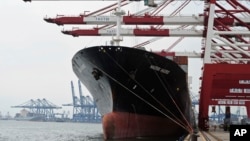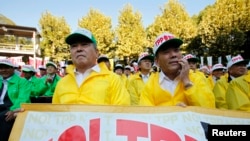The world will be watching when businessman Donald Trump is officially sworn in January 20 as the 45th president of the United States, few with greater interest than China.
There is nearly $600 billion of trade between the two nations each year, the bulk of it, about $466 billion, from Chinese made goods sold in America. Trump has proposed measures to cut the trade imbalance, but some fear the proposed remedies and the tough talk could damage relations between Beijing and Washington and weaken the global economy.
Trump’s campaign rhetoric on international trade was blunt. In his final debate with Democratic rival Hillary Clinton, Trump said, “We’re going to make a great trade deal, and if we can’t, we’re going to go our separate way.”
Watch: Will Trump's Tough Talk on Trade with China Turn into Policy?
Trump’s election ensured the Obama administration’s Trans Pacific Partnership agreement with 11 countries would not get to a vote in Congress, though leaders in both parties had already concluded the administration’s wording was not acceptable.
Additionally, the president-elect has threatened to renegotiate the 1994 North American Free Trade Agreement (NAFTA), and has called China a currency manipulator and promised to fix the massive trade deficit between the two countries by raising tariffs on Chinese made goods by as much as 45 percent.
He has also appointed critics of China, such as California economist Peter Navarro, who wrote a book titled Death by China, to oversee U.S. trade policy.
Retaliation
But the Brookings Institution’s Bill Galston is skeptical of Trump’s rhetoric.
“The idea that this is a one-way street, that we can threaten China and China can’t threaten us back, I think is too simple,” he said. In fact, Galston says there are many different ways China could retaliate.
“To start, they could cancel the orders they placed with Boeing and redirect those orders to Airbus, and that would have a large effect on the economy of the Pacific Northwest,” Galson said. “A fair number of American corporations have set up shop in China, and its easy to imagine how Chinese regulators could turn the screws up on them.”
But while China has not ruled out anything, Chinese Ambassador to the United States Cui Tiankai says Beijing is committed to working out differences between the two countries, saying confrontation is the least viable option for the world’s two largest economies.
“Any trade war, especially a trade war between the two largest economies in the world, will be very damaging to both economies and will hurt the global economy as well. So nobody would benefit,” Tiankai said. “We have to make sure that more people will benefit from the process of globalization. But I don’t think it’s a right approach if anyone tries to raise protectionist barriers between countries. This will only hurt everybody. It will not help anybody.”
Justin Urquhart Stewart who heads corporate development at Seven Investment Management in London calls Trump’s rhetoric on China dangerous politics. He says the truth is the United States needs China as much as China needs the United States.
“After all, they [China] are the second largest holder of American debt and he [Trump] would probably like them to buy some more and certainly not sell it,” Stewart said.
“But equally,” he added, “the Chinese need the Americans because they are one of their largest trading partners — they need them to be still buying Chinese stuff. So, the sooner we get away from rhetoric and down to real proper diplomacy and bargaining structures, to actually stop accusing each other of dumping and currency manipulation and actually get down to brass tacks and what they can do together, the better.”
Negotiation strategy
Chad Bown, a former World Bank economist and now senior fellow on trade policy at the Peterson Institute for International Economics believes Trump’s tough talk is probably just a negotiating ploy rather than a show of hostility toward a major trading partner.
“It certainly seems to be that way in terms of rhetoric,” Bown said. “But that may also partially be his style and coming at these types of issues from a business approach and a negotiating approach and less of a diplomatic or statesmanlike approach, so we’ll have to see, once he actually gets into office, how he chooses to conduct the relationship.”
Despite Trump’s anti-globalization agenda, Bown says actions, not words, will determine the fate of U.S.-China relations.
“He [Trump] has said quite explicitly that he is not interested in the TPP agreement, so we know what he’s against, but we don’t know what he is actually for. So I think we’re going to have to wait and give him a little bit of time, and his team and administration to come into office to get settled down and figure out what their priorities are going to be,” Bown said.
Bown says ignoring China or Asia Pacific trade isn’t going to bring back jobs. It’s more likely to hurt the U.S. economy and create uncertainty and other spillover effects in both emerging and developed economies.











